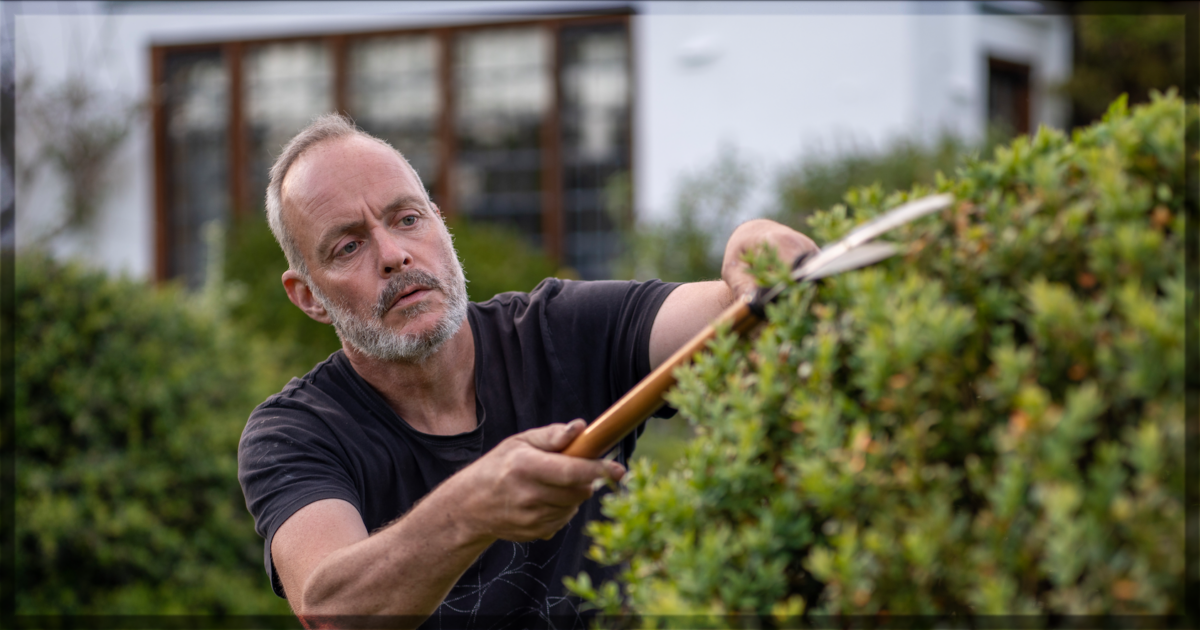In 2016, the press revealed an espionage scheme for the asbestos industry. A hired person would infiltrate the anti-asbestos organizations and leak their plans to the hirers. That man is Robert Moore, a former TV producer of popular prank shows like Da Ali G Show and Candid Camera. After a divorce, he worked for K2 Intelligence, an agency for corporate espionage. For years, Moore would act like a filmmaker interested in documenting the work of organizations protesting against asbestos. It is a toxic material used to produce house roofs, mainly in the Global South. Numerous workers of those industrial plants would get sick from direct contact with the material. The director, Håvard Bustness (Golden Dawn Girls), narrates an investigative podcast on Moore, Into the Dirt, produced by Tortoise Media. In The Gardener, The Buddhist & The Spy, the audience learns about Moore’s espionage during the research and recording of the podcast and the moral issues it brings.
The director closely follows the podcast development by Ceri Thomas, an award-winning investigative journalist in Britain. Bustness even uses some of the podcast program’s narration in the film. There is an interconnection between the film and the audio format, mainly because it reflects the relationship between Thomas, Moore, and Bustness. Regarding structure, it borrows (even indirectly) from the double spy element of his work as a spy. Therefore, in the middle of the film, the director finds himself hung between his subject/director relationship with Moore and the information he is hiding from the Tortoise production. It is a constant game of questioning trust and truth. In this sense, morality is a pivotal discussion throughout the whole film. Why did a Buddhist man make money from lies? Can people trust Moore? Should he get another chance? These are some of the questions often approached in the documentary thesis.
However, when the film employs a double espionage narrative structure, the director repeats himself for a lengthy period. Bustnes is obsessed with maintaining his relationship with both parts to continue recording the film. Moore is a tough man to work with. The analysis of his character falls under the diagnosis of his selfish persona, a man who wants to tell his story through his exclusive vision. Moore does not open himself to other creative inputs on how to expose the K2 scandal. Indeed, it is a complicated story; its ethical core is complex. Nonetheless, Moore hijacks the narrative by a presumption that no one may tell his story better than himself. Yet, there is a thin line between the subject’s engaging and nuanced personality and the utter discomfort provoked by his attitudes. It sums up when the director finalizes the film without any response from Moore.
The close connection between the director and the subject leads to ruin in the last moments. The film ends on an uneven and rushed note because of the creative choices he demands. There is an urge for an investigation to link a multi-millionaire and the industry. However, it is a pointless element to the film once the answer does not add any particular substance to the process. It sums up the film. It is a bloated investigative process with way too many threads and sub-plots. The director wants to discuss the Tortoise investigation, the relationship between Thomas and Moore, and the connection with the former organization partners. The director focuses on multiple factors to understand the motives behind his reasonings. He wants to comprehend the contradictions in the actions, but he forgets to engage the audience with the concrete materials he has. There is an available archival through recordings by Moore that are not used that much in the film. There is a lack of deeper context to engage more with the invitation by the director.
Thus, the conclusion is not satisfying, as Moore rejects his involvement with any of this. Bustnes decides to question the character and ethics rather than exploring the scandal holistically in comprehending the intricacies. His bet does not pay off that well, as his effort drags most of the middle section and repeats over the story. It does not help that his egocentric subject has a strong saying in the creative process, and the directing stretches his influence the most. Likewise, the film has its most engaging moments when it investigates the espionage case. Also, the film features a score emulating a cerebral type of music that does not work in most moments, as it emulates a film that is not there.
The Gardener, the Buddhist & the Spy is a disappointing documentary on a fascinating case. The director chooses not to engage in the investigation but the moral, and he could not articulate his tentative enough.
The Gardener, the Buddhist & the Spy recently played at the It’s All True Festival Documentary Film Festival.
Learn more about the film at the festival’s official website.


